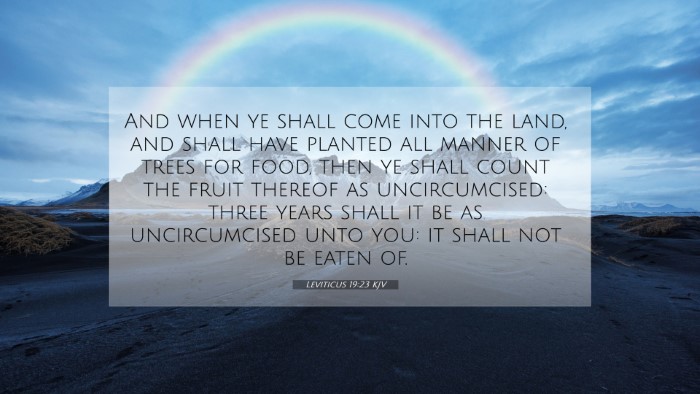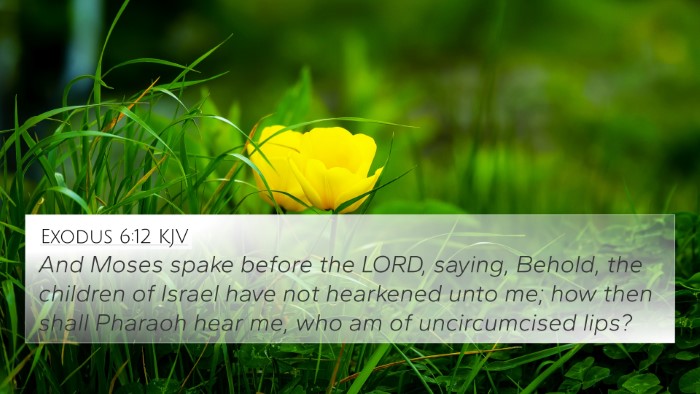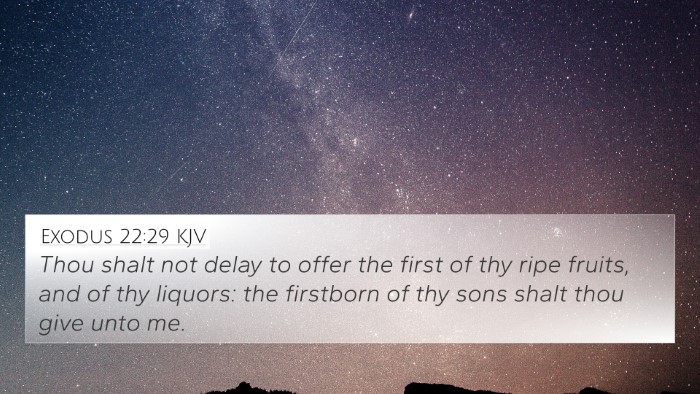Understanding Leviticus 19:23
Verse: Leviticus 19:23 - "And when you shall come into the land, and shall have planted all manner of trees for food, then you shall count the fruit thereof as uncircumcised three years shall it be uncircumcised unto you: it shall not be eaten of."
Summary of Meaning
The verse from Leviticus 19:23 addresses the protocols that the Israelites were to follow regarding their agricultural practices, particularly regarding fruit-bearing trees. The principle articulated in this verse reflects a deeper theological understanding of holiness and sacredness in the life of the Israelite community.
Key Insights
- Matthew Henry's Commentary: This commentary emphasizes the significance of the three-year period during which the fruits of a newly planted tree are not to be eaten. It symbolizes a time of waiting and preparation, highlighting that provision and sustenance from God should be regarded with respect and patience. The non-edibility of the fruit also implies a separation for a sacred purpose.
- Albert Barnes' Notes: Barnes elucidates the broader implications of this verse on the moral and spiritual condition of the people. He points out that the practice was aimed at instilling a sense of discipline and reverence towards the cultivation of the land. The fruit being counted as 'uncircumcised' illustrates that before they are ceremonially clean, like the covenant of circumcision symbolizes purity and belonging.
- Adam Clarke's Commentary: Clarke notes that this statute is indicative of God's order and system in creation. The process of allowing trees to mature before yielding fruit teaches patience and diligence in all endeavors. The structure of waiting aligns with God's creation order, reflecting a divine patience as well.
Bible Verse Connections
Leviticus 19:23 serves as an anchor from which many thematic connections in Scripture can be drawn:
- Genesis 1:11-12: God’s original command to let the earth bring forth vegetation reflects His established order in nature.
- Exodus 22:29: This verse reinforces the idea of consecration, as the Israelites are reminded to dedicate the first fruits and not delay in offering to God, highlighting the connection of holiness in their harvest.
- Deuteronomy 26:1-11: The act of bringing the first fruits as an offering mirrors the lessons of patience and reverence underscored in Leviticus 19:23.
- Matthew 7:16-20: Jesus teaches about recognizing trees by their fruits, highlighting the spiritual implications of what is produced in one's life when waited upon and cultivated correctly.
- Galatians 5:22-23: The fruits of the Spirit serve as a New Testament parallel, demonstrating what is cultivated within a believer over time.
- Hebrews 6:7-8: This passage speaks to the analogy of land producing crops based on the care it receives, paralleling the attentive care required for one’s spiritual life.
- James 5:7-8: James encourages believers to be patient until the Lord's coming, stating the farmer waits for his precious crop, thus drawing a direct link to the theme of patience found in Leviticus 19:23.
Cross-Referencing and Theological Connections
By understanding Leviticus 19:23 through the lens of cross-referencing, we see how biblical texts are interwoven to form a richer tapestry of theological thought:
- Tools for Bible Cross-Referencing: Utilizing a Bible concordance or a cross-reference guide can help deepen comprehension of how interconnected these scriptures are.
- Connecting Old and New Testaments: Identifying connections between Old Testament laws and their fulfillment in New Testament teachings can enhance overall understanding.
- Bible Verse Parallels: Emphasis on delayed gratification and holiness can remind believers of the necessity to grow in faith before reaping spiritual rewards.
- Inter-Biblical Dialogue: Understanding how Leviticus interplays with teachings in the Gospels helps paint a picture of continuity in scripture.
Application and Reflection
In contemplating Leviticus 19:23, believers are invited to reflect upon their own spiritual growth and readiness to bear fruit. Just as the land requires patience and care, so too does the heart require nurturing and time to cultivate results. Therein lies a powerful lesson in fidelity and stewardship regarding God’s blessings.
Conclusion
Leviticus 19:23 serves not only as an agricultural directive but also as a spiritual metaphor for life and faith. Through cross-referencing and evaluating neighboring verses, the holistic teachings of the Bible become more apparent, revealing God's unwavering commitment to process, purity, and patience.











